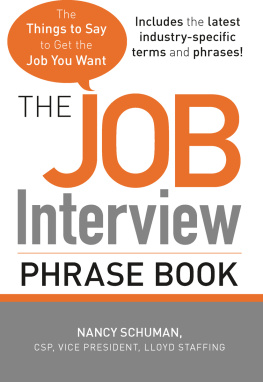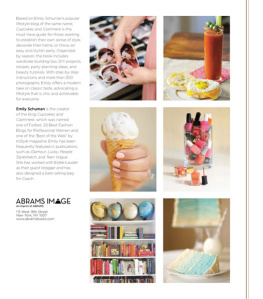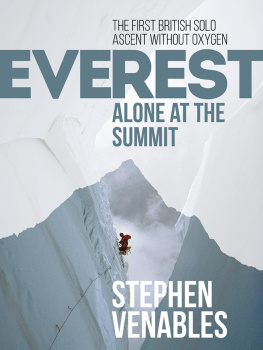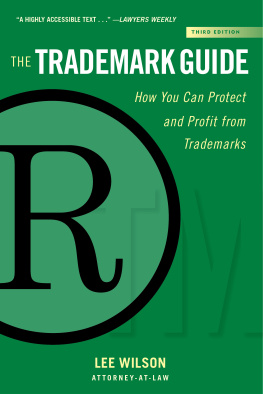THE JOB
Interview
PHRASE BOOK
The
Things to Say
to Get the
Job You Want
NANCY SCHUMAN,
CSP, VICE PRESIDENT LLOYD STAFFING

Copyright 2009 by F+W Media, Inc.
All rights reserved.
This book, or parts thereof, may not be reproduced in any
form without permission from the publisher; exceptions are
made for brief excerpts used in published reviews.
Published by
Adams Media, a division of F+W Media, Inc.
57 Littlefield Street, Avon, MA 02322. U.S.A.
www.adamsmedia.com
ISBN 10: 1-4405-0184-X
ISBN 13: 978-1-4405-0184-5 (paperback)
ISBN 13: 978-1-44050-446-4 (EPUB)
Printed in the United States of America.
J I H G F E D C B A
Library of Congress Cataloging-in-Publication Data
is available from the publisher.
This publication is designed to provide accurate and authoritative information with regard to the subject matter covered. It is sold with the understanding that the publisher is not engaged in rendering legal, accounting, or other professional advice. If legal advice or other expert assistance is required, the services of a competent professional person should be sought.
From a Declaration of Principles jointly adopted by a Committee of the American Bar Association and a Committee of Publishers and Associations
Many of the designations used by manufacturers and sellers to distinguish their product are claimed as trademarks. Where those designations appear in this book and Adams Media was aware of a trademark claim, the designations have been printed with initial capital letters.
This book is available at quantity discounts for bulk purchases.
For information, please call 1-800-289-0963.
Introduction
If you've picked up this book, you've most likely landed an interview. Congratulations! Now comes the work of preparing for whatever questions you might be asked. Every interview is different mostly because every interviewer has a different idea of the types of questions they'll ask you. Some may focus on your past work experience without getting into personal details, and others may rely on personal questions to help them figure out if you're a good fit for the company. You need to be ready for any type of question that comes your way. That's where The Job Interview Phrase Book comes in handy.
Divided into ten chapters, The Job Interview Phrase Book is a concise guide suitable for new and seasoned job seekers alike. Chapter 1 reviews basic etiquette and how to get an interview off to a good start. The following chapters walk you through pairs of questions and answers on topics ranging from your skills, accomplishments, and career goals to your business sense, interest in the company, and education. You'll learn how to handle tough questions about your career. Not sure what to say when asked about a bad boss? Wondering how to explain to a potential employer that you were fired? Whether you've been unemployed for months or years, held numerous jobs in a short period of time, or are applying for a job outside of your industry, this book will steer you in the right direction with clear answers that you can deliver with confidence. Each question and answer is followed by a brief synopsis that explains why the given answer is appropriate and how it will help you stand out to your interviewer. To help prevent you from getting tongue-tied when asked about your age, religion, or political views, a section on illegal questions helps you respond appropriately without giving away information that is no one's business but your own. A final chapter lists popular buzz words and phrases according to industry. You can use the language in this section during interviews or even apply it to your resume.
A job interview is a chance to talk about what you've accomplished in your career and why you're ready to move on to a new opportunity. No one knows you better than yourself, so make sure you're able to present yourself in the best light possible. Use The Job Interview Phrase Book to prepare and practice and ultimately get the job!
1
Preparing for the Interview
H AVE YOU EVER WONDERED WHAT THE POINT OF A JOB INTERVIEW IS? T HE employer has your resume. Can't she just look at it to see whether you have the necessary skills and experience? All she should need to do is make a phone call or two to verify that information, right? While it is made up of information about your past experience, your resume doesn't give the employer a full picture of who you are. Your resume is only a summary of your skills, work experience, and educational background. With only your resume to rely on, the person interviewing you won't have any idea of the specific things about you that will set you apart from the other candidates.
After all, a resume is merely a piece of paper, and you are so much more than that. An interviewer can't learn about someone's personality by looking at a resume. She can't discover how a candidate developed some of his skills or which accomplishments meant the most to him. The interviewer can't find out how the candidate reacts to change or adversity by reading his resume.
The only way an interviewer can learn any of those things about a job candidate is by talking to him and asking questions. This will allow the candidate to paint a picture of himself that is much more elaborate than what can fit on one sheet of paper.
Preparing to Answer Questions
You will be asked a variety of questions on a job interview. These questions will pertain to your skills and abilities, accomplishments, education, and work history. You will also be asked questions about your strengths and weaknesses, your interests and hobbies, and your likes and dislikes, all of which will allow the employer to learn about your personal traits or characteristics.
In the chapters that follow, you will find answers and key phrases to use when responding to questions you might encounter on a job interview. Use them as a guideline. While you should not go into a job interview with a memorized script, you should have an idea of how you will answer most questions that will come your way. Chapter 9 gives you ideas for the types of questions you should ask the interviewer. Use these questions in the same way as a guideline to be adapted to your particular situation and the company and industry you are interviewing with.

Be Specific
On a job interview, you will be asked questions about your skills, for example. Of course, you know what skills you have, but can you discuss how you acquired them? What if you're asked about your accomplishments? You've no doubt accomplished a lot at work, but can you recall specifics? You need anecdotes that clearly back up your claims, so it is imperative that you prepare in advance and have some good examples of your strengths ready when the subject comes up.

Take Time to Rehearse
In preparing for job interviews it is important that you do some practice interviewing, both alone and with others. Rehearsing for interviews will allow you to work on any problems that may be viewed as negatives by the interviewer. Rehearsing will also allow you to become more comfortable with the interview process. By the time you go on an interview, you will have no problem confidently answering questions.
The First Defining Moments
The first minute or two of any interview is the most crucial. As the saying goes, you only get one chance to make a great first impression, and this is when you want to do just that. Your goal is to wow the interviewer and make a favorable impression that will give you an edge over some of your rivals and open the door to an offer of employment.












 Be Specific
Be Specific